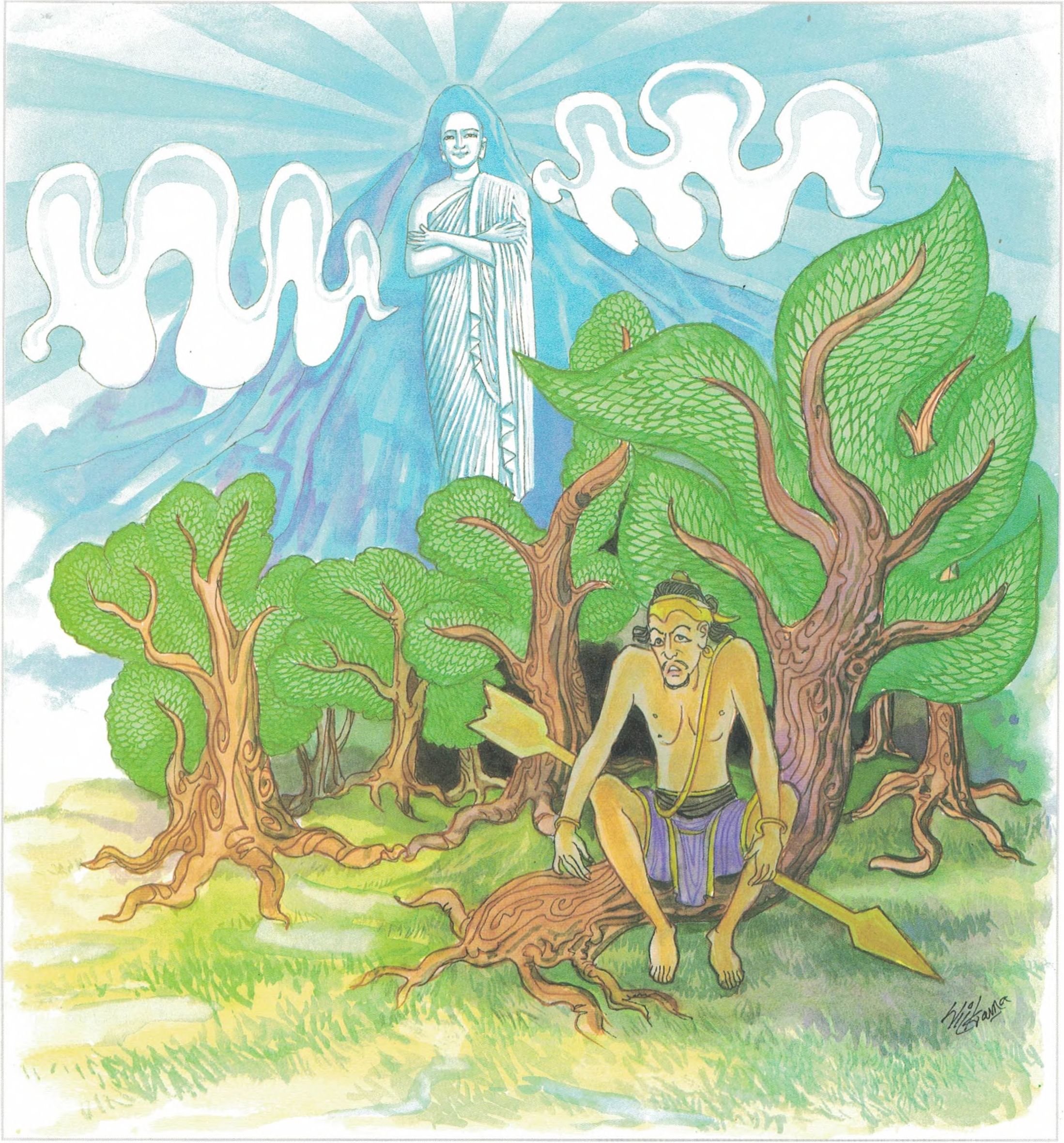Dhammapada (Illustrated)
by Ven. Weagoda Sarada Maha Thero | 1993 | 341,201 words | ISBN-10: 9810049382 | ISBN-13: 9789810049386
This page describes The Story of Culasubhadda which is verse 304 of the English translation of the Dhammapada which forms a part of the Sutta Pitaka of the Buddhist canon of literature. Presenting the fundamental basics of the Buddhist way of life, the Dhammapada is a collection of 423 stanzas. This verse 304 is part of the Pakiṇṇaka Vagga (Miscellaneous) and the moral of the story is “The virtuous are visible from afar. The unworthy, like arrows at night, aren’t seen tho’ near”.
Verse 304 - The Story of Cūlasubhaddā
Pali text, illustration and English translation of Dhammapada verse 304:
dūre santo pakāsanti himavanto'va pabbato |
asant'ettha na dissanti rattikhittā yathā sarā || 304 ||
304. Afar the true are manifest like Himālayan range, yet even here the false aren’t seen, they’re arrows shot by night.
 The virtuous are visible from afar. The unworthy, like arrows at night, aren’t seen tho’ near. |
The Story of Cūlasubhaddā
While residing at the Jetavana Monastery, the Buddha spoke this verse with reference to Cūlasubhaddā, the daughter of Anāthapiṇḍika.
Anāthapiṇḍika and Ugga, the rich man from Ugga, studied under the same teacher when they were both young. Ugga had a son while Anāthapiṇḍika had a daughter. When their children came of age, Ugga asked for the consent of Anāthapiṇḍika to the marriage of their two children. So the marriage took place, and Cūlasubhaddā, the daughter of Anāthapiṇḍika, had to stay in the house of her parents-in-law. Ugga and his family were followers of non-Buddhist ascetics. Sometimes, they would invite those non-Buddhist ascetics to their house. On such occasions, her parents-in-law would ask Cūlasubhaddā to pay respect to those naked ascetics, but she always refused to comply. Instead, she told her mother-in-law about the Buddha and his unique qualities.
The mother-in-law of Cūlasubhaddā was very anxious to see the Buddha when she was told about him by her daughter-inlaw. She even agreed to let Cūlasubhaddā invite the Buddha for alms-food to their house. So, Cūlasubhaddā prepared food and collected other offerings for the Buddha and his disciples. She then went up to the upper part of the house and looking towards the Jetavana Monastery, she made offerings of flowers and incense and contemplated the unique qualities and virtues of the Buddha. She then spoke out her wish, ‘Venerable! May it please you to come, with your disciples, to our house tomorrow. I, your devoted lay-disciple, most respectfully invite you. May this invitation of mine be made known to you by this symbol and gesture.” Then she took eight fistfuls of jasmin and threw them up into the sky. The flowers floated through the air all the way to the Jetavana Monastery and lay hanging from the ceiling of the congregation hall where the Buddha was expounding the Dhamma.
At the end of the discourse, Anāthapiṇḍika, the father of Cūlasubhaddā, approached the Buddha to invite him to have almsfood in his house the following day. But the Buddha replied that he had already accepted Cūlasubhaddā’s invitation for the next day. Anāthapiṇḍika was puzzled at the reply of the Buddha and said, “But Venerable! Cūlasubhaddā does not live here in Sāvatthi; she lives in Ugga at a distance of one hundred and twenty yojanas from here.” To him, the Buddha said, “True, householder, but the good are clearly visible as if they are in one’s very presence even though they may be living at a distance.”
The next day, the Buddha came to the house of Ugga, the father-in-law of Cūlasubhaddā. The Buddha was accompanied by a multitude of monks on this trip;they all came through the air in decorated floats created by the order of Sakka, king of the devas. Seeing the Buddha in his splendour and glory, the parents-in-law of Cūlasubhaddā were very much impressed and they paid homage to the Buddha. Then, for the next seven days, Ugga and his family gave alms-food and made other offerings to the Buddha and his disciples.
Explanatory Translation (Verse 304)
santo dūre himavanto pabbato va pakāsenti
ettha asanto ratti khittā sarā yathā na dissanti
santo [santa]: the subdued ones; dūre: even if at a distance; himavanto pabbato iva: like a snowy mountain peak; pakāsenti: become vividly visible; ettha: in this world; asanto [asanta]: the undisciplined persons; ratti khittā: shot in the dark; sarā yathā: like arrows; na dissanti: cannot be seen
Like the Himālayas, the good are visible even from afar; like arrows shot in the night, the wicked are not even seen though they may be near.
Commentary and exegetical material (Verse 304)
santo;asanto: the tranquil one and the undisciplined one. According to this, good saintly people are visible from afar like the Himālayas. The wicked are unseen–like arrows shot in the dark.
